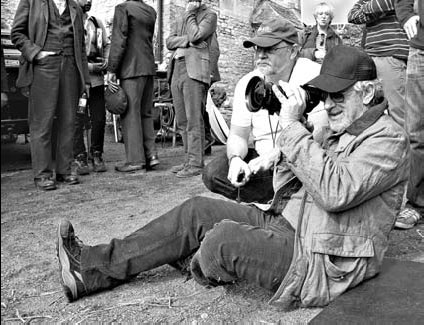Spielberg again taps his youthful side
Updated: 2011-11-06 07:43
By Michael Cieply(The New York Times)
|
|||||||
|
Steven Spielberg on the set of "War Horse," one of three movies he will have directed in the span of a year. Andrew Cooper / Dreamworks Pictures |
LOS ANGELES - The line between art and commerce can be a scary place.
Time and again Steven Spielberg has held the audience in the palm of his hand. Now 64, he is not simply the best-selling film director of all time; his domestic ticket sales, at about $3.8 billion, roughly match the combined sales of his next two rivals, Robert Zemeckis and James Cameron.
Yet Spielberg the Artist has often struggled, as if the box-office hits were a handicap to be overcome.
Who could forget the Great Snub of 1986, in which "The Color Purple" got 11 Oscar nominations - though not for Mr. Spielberg's directing - and won nothing? In 1987 Mr. Spielberg won his first Oscar, an honorary Irving G. Thalberg award. After some ferocious campaigns, three more Academy Awards would follow, for "Schindler's List" and "Saving Private Ryan."
Those left him short of the recognition given Walt Disney, with his 26 statuettes, or even Billy Wilder, with 7, and Francis Ford Coppola, with 6.
Lately Mr. Spielberg has been working as if he intends to close the gap.
He will twice enter the awards race, once with an ambitious 3-D, motion-capture animation film, "The Adventures of Tintin," and again with a period drama, "War Horse," based on the children's book whose stage adaptation on Broadway won the Tony Award for best play in June. Both are being released in the United States for Christmas, on December 21 and 25 respectively. "Tintin" was released in most of Europe in October and the rest of the world will get it this month. "War Horse" will be released worldwide in late December.
Mr. Spielberg declined to be interviewed about those films. He was busy with "Lincoln," a drama about the last months of Abraham Lincoln, starring Daniel Day-Lewis. If "Lincoln" is released in late 2012, Mr. Spielberg will have directed three major films in the span of a year.
And the movies have come on top of television ventures. It is a pace that startles even Kathleen Kennedy, a producer who has worked with Mr. Spielberg for more than 30 years.
"He's often choosing for emotional reasons," she said. "I do think that plays a role in what he chooses to do."
For those who wonder what drives him (money is no object: The Los Angeles Business Journal recently listed him as this city's eighth richest person, with an estimated $3.2 billion net worth), Mr. Spielberg has left clues. Perhaps the most telling was tucked away last year in a guide to an exhibition at the Smithsonian American Art Museum on Norman Rockwell works from the collections of Mr. Spielberg and George Lucas.
In the guide Mr. Spielberg discusses the painting "Boy on High Dive," in which a boy crouches on the end of a diving board, looking fretfully over the edge. "For me, that picture represents every motion picture just before I commit to directing it," he says.
The painting is about fear, and so are Mr. Spielberg's films this year - and, at some level, almost always.
The core of "The Adventures of Tintin," based on the Belgian artist Herge's classic series about the capers of a teenage reporter and his dog, turns on Mr. Spielberg's use of digital magic to communicate a stomach-churning sense of threat to a boy and his beast.
In that sense "Tintin" forms a matched set with "War Horse," which is about a boy, played by the newcomer Jeremy Irvine, who follows his horse into the carnage of World War I.
In a brief e-mail exchange Mr. Spielberg disagreed. The films, he said, "are each other's polar opposite."
Asked what he wished for the film industry at large, Mr. Spielberg in his e-mail said he would like to see as much passion devoted to storytelling and "the discovery of new voices" as has gone toward the quest for new technologies.
With his latest movies, Mr. Spielberg seems more than casually intent on tapping the power of youth.
A child's panic, he has said, is at the core of his art. "I was born a nervous wreck, and I think movies were one way of transferring my own private horrors to everyone else's lives," he told Rolling Stone magazine in 2007.
And he has worked to flush that anxiety from his professional life while fighting to preserve and heighten it in pictures like "War Horse" and "Tintin."
The composer John Williams, asked what keeps his longstanding partnership with Mr. Spielberg fresh, pointed to the diversity of the director's work, and to new technical challenges, like that of scoring animation, which he has not previously done.
There is that. And the eternal panic of a boy who wants everyone to love his pictures - audience and Academy alike - and is still diving in.
The New York Times
(China Daily 11/06/2011 page12)
